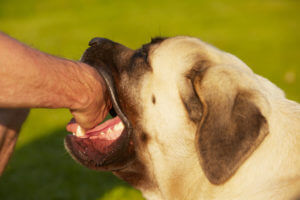 Dog bite cases in Pennsylvania are governed both by state statutes and by case law. According to Pennsylvania’s Dangerous Dog Laws, a dog is “dangerous” if the dog has injured a person, without provocation, on public or private property; the dog has killed or injured a domestic animal without provocation, while off the owner’s property; the dog has attacked a human being without provocation; or the dog was used to commit a crime. In addition to any of the preceding elements, the dog must also have a history of attacking either humans or domestic animals, or a “propensity” for attacking either humans or domestic animals without provocation. This is known as the “One Bite Law.” In other words, the dog can get a pass on its first bite, but the second one establishes a propensity for attacking. Another law, Pennsylvania’s dog confinement and housing law, holds dog owners liable for damages if they fail to keep their dog in the house or yard, on a leash, or “under the reasonable control of some person.” If a dog escapes reasonable confinement and causes an injury, the dog does not need to be classified as dangerous or have a history of attacking for the owner to be liable. A Pennsylvania dog owner typically can assert the defenses of provocation and trespassing defenses to a dog bite claim.
Dog bite cases in Pennsylvania are governed both by state statutes and by case law. According to Pennsylvania’s Dangerous Dog Laws, a dog is “dangerous” if the dog has injured a person, without provocation, on public or private property; the dog has killed or injured a domestic animal without provocation, while off the owner’s property; the dog has attacked a human being without provocation; or the dog was used to commit a crime. In addition to any of the preceding elements, the dog must also have a history of attacking either humans or domestic animals, or a “propensity” for attacking either humans or domestic animals without provocation. This is known as the “One Bite Law.” In other words, the dog can get a pass on its first bite, but the second one establishes a propensity for attacking. Another law, Pennsylvania’s dog confinement and housing law, holds dog owners liable for damages if they fail to keep their dog in the house or yard, on a leash, or “under the reasonable control of some person.” If a dog escapes reasonable confinement and causes an injury, the dog does not need to be classified as dangerous or have a history of attacking for the owner to be liable. A Pennsylvania dog owner typically can assert the defenses of provocation and trespassing defenses to a dog bite claim.
Dog bite claims in Delaware are covered by a specific statute. The statute makes the dog’s owner liable for damages if the dog caused injury, death, or property damage, as long as the injured person was not provoking the dog, and the injured person was not committing trespass or a crime or attempting to commit trespass or a crime. Delaware’s dog bite law is somewhat more inclusive than Pennsylvania’s dog bite law. It allows a victim to recover on any kind of injury or damage to person or property, not just a bite, and also allows all victims, not just human, to recover from an injury caused by a dog. Further, Delaware allows victims to recover in more ways than victims can in Pennsylvania and to use these methods to proceed against not only the dog owner but potentially other third parties as well, such as a dog walker. Delaware allows injured people to bring lawsuits based on negligence, or a failure to use reasonable care to prevent a dog-related injury, instead of bringing a lawsuit under a statute. A negligence claim may be useful if the person who failed to use reasonable care is not the dog’s owner. Additionally, a victim in Delaware need not show that a dog has a history or propensity for attacking, as one would need to do in Pennsylvania under the one-bite rule. A dog owner in Delaware can also assert the two defenses of provocation and trespassing defenses to a dog bite claim.
Dog bites in New Jersey are covered by statute. The statute makes the dog’s owner liable for any dog bite that occurs when the person bitten is in a private place or lawfully in a public place, regardless of any prior indications of viciousness of the dog, or the owners’ knowledge of any former viciousness. New Jersey’s dog bite statute is a “strict liability” statute. This means that the owner is liable for injuries caused by the dog bite, even if he or she used reasonable care to restrain the dog or to protect or warn others. In New Jersey, a victim does not need to prove that the dog’s owner was careless or negligent. All that needs to be proven is that the bite occurred. The statute covers only injuries caused by dog bites. It does not cover injuries caused by dogs in other ways, as Delaware’s statute does. A dog owner in New Jersey has at least one possible defense to a dog bite claim which is that the dog bite victim was trespassing when the incident occurred. New Jersey’s dog bite statute does not provide for the defense of provocation, which many strict liability states, such as Delaware, do.
If you or a loved one has been bitten by a dog, contact our experienced Media Personal Injury Attorneys to fight for you. You can call us at the number above or contact us using the form below.
